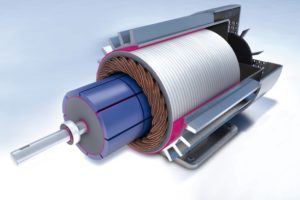New structural adhesive stable at high temperatures
SUPRATEC Syneo and its partner DELO present a new adhesive that offers three times the resistance at high temperatures than the previous product. The DELO MONOPOX HT2860 adhesive can be cured by induction, significantly accelerating the assembly process. This epoxy resin is used in electric motors, among other things.

Most epoxy resins change their polymer structure at temperatures of +150°C or higher, which reduces performance. In addition, beyond this temperature range, elasticity often increases.
With DELO MONOPOX HT2860, DELO has developed a structural adhesive with a glass transition temperature (Tg) of +168°C. As a result, the Young's modulus below the Tg temperature does not change significantly, the adhesive has a very high temperature resistance and a flexibility that only increases above this temperature. On sandblasted aluminium and at a temperature of +150 °C, DELO MONOPOX HT2860 achieves a strength of 18 MPa. This is up to three times higher than standard epoxy resins.
The adhesive has excellent adhesion to metals as well as temperature-resistant plastics, ferrites and ceramics. At room temperature it has a compressive and shear strength of 65 MPa on aluminium and 55 MPa on ceramics.
The adhesive cures in a furnace or by induction. The latter method allows a reduction in process times of up to 90%; the adhesive achieves the same strength as with standard curing at +150 °C and 40 minutes in a convection oven.
DELO MONOPOX HT2860 adhesive cartridges can be used on the production line at room temperature for up to four weeks.
The DELO MONOPOX HT2860 adhesive has an application temperature range of -55 to +220 °C and can be used for bonding under high static or dynamic loads. This is the case, for example, in the automotive industry for bonding magnets in electric motors.
The temperature-resistant structural adhesive is used, among other things, for bonding magnets in electric motors.
» See our glues DELO MONOPOX®
» Back to our News

